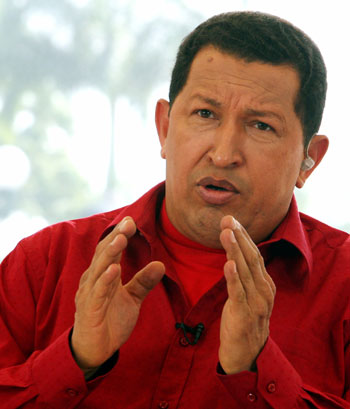Venezuelan President Hugo Chavez said the U.S. ambassador was "provoking the
Venezuelan people" and threatened Sunday to expel the American diplomat, whose
convoy was chased by pro-government protesters on motorcycles.

Venezuelan President
Hugo Chavez speaks during his weekly broadcast 'Alo Presidente' in the
state of Carabobo April 9, 2006. Chavez on Sunday threatened to expel the
U.S. ambassador to Caracas William Brownfield after accusing him of
provoking tensions in a warning that will further strain diplomatic ties.
The threat came after pro-Chavez demonstrators lobbed eggs, fruit and
vegetables at the ambassador's car and the U.S. State Department warned
Venezuela it could face consequences if it did not protect the U.S. envoy.
[Reuters] |
Chavez condemned the crowd of protesters for pelting U.S. Ambassador William
Brownfield's car with eggs and tomatoes, saying his government "rejects any kind
of aggression."
But he suggested Brownfield, who was returning from a visit to a ballpark in
Caracas' poor Coche neighborhood, a Chavez stronghold, sought a confrontation by
failing to advise authorities adequately of his travel plans and venturing into
a place where his presence was unwelcome.
"I'm going to throw you out of Venezuela if you continue provoking the
Venezuelan people," Chavez said in a nationally televised speech addressed to
Brownfield.
Chavez's incendiary comments came after Washington warned of "severe
diplomatic consequence" if a similar incident repeats itself.
"If the Washington government takes some measure against Venezuela motivated
by provocations, you will be responsible, you will have to leave here, sir. I
will declare you persona non grata in Venezuela," Chavez responded Sunday in the
address to Brownfield.
Chavez accused Washington of seeking to escalate tensions and threatening
Venezuela.
"With your imprudence and provocation, you could one of these days cause a
grave incident because (you walk) around with people who are armed, with
security forces," Chavez said.
U.S. Embassy spokeswoman Salome Hernandez said the embassy refused to respond
to "hypothetical" scenarios but added, "the ambassador will continue to travel
and we will not be intimidated."
Relations between the United States and Venezuela, the world's fifth largest
oil producer, have deteriorated sharply in recent months.
Chavez has threatened repeatedly to halt oil exports to the United States,
and in February, Washington expelled a Venezuelan diplomat in response to
Chavez's expulsion of a U.S. embassy official for alleged spying.
In the incident Friday, Chavez said Brownfield failed to advise the local
mayor's office or the foreign ministry of his travel plans. Hernandez said the
embassy is not required to advise those institutions but that it takes adequate
precautions by regularly coordinating with law enforcement authorities for such
events.
The response to his visit Friday was the third time in three weeks that
Brownfield has been met by protests. Earlier, demonstrators burned tires and
torched an American flag.
The State Department said the incident Friday "clearly was condoned by the
local government," with local officials handing out snacks to perpetrators at
the stadium. U.S. officials accused police of doing nothing, saying a single
city police car stayed well behind the convoy while motorcyclists pounded and
kicked the ambassador's car.
The Caracas mayor's office denied involvement,
Chavez says the United States of plotting against him, an accusation American
officials deny.
Washington, however, has raised concern about the health of democracy under
Chavez and has accused him of destabilizing Latin America. Chavez has responded
by saying his government is democratic and it is the U.S. that is a
destabilizing force.